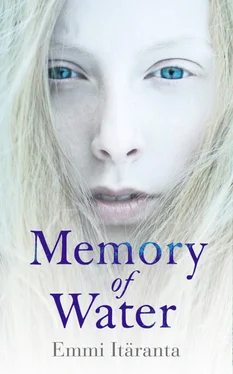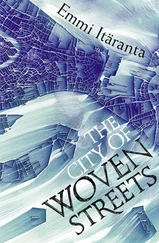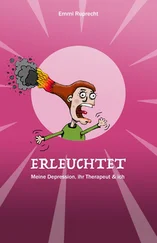‘Brilliant,’ Sanja gasped. ‘A fake passpod!’ I knew her expression: it meant she was already wondering about how the message-pod had been hacked, and if she could do the same. ‘It’s been programmed to connect the fake identity to your ID data record,’ she continued. ‘But in anyone else’s hands it’s a completely ordinary message-pod.’
A red light and number 1 were flashing in the corner of the display to show that there was one message. I tapped the light with my fingertip.
If this finds you, began the message, it’s important you do as I tell you. It is not safe for you to stay where you are. Contact Bolin. He will help you to get a train ticket. Once you know when you are coming, send me the information using this message-pod. Don’t use the other one, but leave it behind when you leave home. I hope to see you soon.
There was no signature, but I knew the handwriting: it belonged to my mother.
Sanja and I were quiet for a long while. Eventually she asked, ‘Are you going?’
‘I don’t know,’ I replied. I understood now why my mother had asked me to send some object. She had needed my fingerprint for the fake passpod, but couldn’t ask for it directly out of fear that our mail was being monitored. She must have had to bribe someone in order to make sure that I received it. I had sent the spoon over a month ago, so the passpod had probably been on its way for several weeks.
I should have been excited about my mother’s offer. If she was asking me to come, it meant that Xinjing was relatively safe despite the war. My life would be easier without the constant hiding and guarding of the spring, without seeing the narrowing faces in the village, without the fear of seeing which house would be the next to bear a blue circle on its door. I wouldn’t need to carry water from the fell or take it to Sanja, nor clean the house and tend to the garden and make the tea sweets alone. We could do things together again, as we had before her departure and my father’s death. The same weariness that had wrapped me the night before and was still clinging to my bones crashed into me so gravely that I suddenly wanted to lie down on the kitchen floor and just let things happen around me. I wished for someone else to take responsibility for my life, for everything that had only recently become part of my everyday routine. Xinjing shone distant, veiled in soft mist, easy and welcoming as a dream.
Yet the same thing I wanted to escape demanded that I stay. Who would look after the spring, if I left? Who would Sanja go to, when she needed water for her family? Would the punishment not be placed on her if I left the spring in her care, the military found out about it somehow and I was elsewhere, at the other end of the continent? I could not put her in such danger.
Behind all this loomed a possibility that had only begun to materialise into a clear path from scattered shards: the water that was not here, but in the Lost Lands. I could follow my mother’s wishes and travel to Xinjing, or my father’s and stay here to guard the spring. Or I could do as I wanted, and choose an unfamiliar path that was not dictated by either one of them.
That day all possibilities looked equal, but even then one of them had already begun to reach beyond the others, to bend me towards itself.
We drank tea and ate amaranth bread, which we dipped in sunflower oil. I saw Sanja trying not to devour the food.
‘I’ve always wondered if it would be possible to crack the ID protection somehow,’ she said. ‘I have an idea about it. I might be able to do the same.’
I knew she would have loved to take the fake passpod to her workshop to study it, but didn’t want to ask directly and I was not ready to offer it to her. I would need the pod if I decided to travel to Xinjing, and I was worried she might remove the fake information by mistake.
When we had finished our tea and bread, Sanja took her waterskins to the kitchen tap and filled them. I would need to go to the spring next week to close the spare water pipe leading to the house. We carried the skins together into her cart. We had begun to keep a large seagrass trunk in the cart in which we would lay the waterskins flat. On top of the skins we placed the fake bottom Sanja had built, and when it was in place, we loaded the trunk with old clothes and empty, broken waterskins. If the water guards stopped Sanja to check the trunk – which happened occasionally – they would only find repair and sewing jobs, which I had commissioned with Sanja and her mother.
I watched as the wheels of Sanja’s cart left tracks in the dirt of the road when she walked away. A threadbare shirt sleeve flickered from under the closed lid of the trunk like a white, wind-torn flame.
Sanja had begun to come with me whenever I walked to the spring to check the surface level of the water. The weather was turning hot, and many times the fell was the only place where it was cool. Those days we went to the cave only to escape the heat of the day. Previously I had walked to the spring, glanced at the surface of the water and turned back. Now our shared trips to the fell became frequent. We would sit by the dry riverbed, eating food we had brought or watching clouds passing in the sky. Sometimes I would read a book while she was drawing in a notepad I had given her. The core of these visits, however, was always the spring, and although we never spoke of it, I believe she felt the way I did: that the threat of the spring drying and being lost to us did not seem real, and when we walked into the cave and to the edge of the water, it was every time like entering another world. The boundless luxury of water belonged to us alone, and I didn’t want it to be otherwise.
Time is not to be trusted. A few weeks can seem like the beginning of forever, and it’s easy to be blinded when you believe nothing needs to change.
That day we had spent perhaps an hour, perhaps two at the spring; we had no reason to keep track of time. The sun was hot and the insects fierce, and the shadows of the cave rested soothingly against our skins burnt by the early summer. My garden was waiting to be weeded at home, and Sanja had a table full of repair jobs in her workshop, but we were loitering. Sanja was in a good mood and was designing an installation of loose stones in the faint light of the blaze lanterns we had brought.
‘What are those?’ I asked. She had fashioned an angular pile of stones and placed a circle of small stone figures with painted, angry faces around it.
‘That’s a house,’ Sanja said and pointed at the stone construct at the centre of the circle. ‘Those are water guards.’ She pointed at the stone figures surrounding the house. ‘And those two are us.’
A little further away outside the stone circle there were two more figures. She had moulded a piece of plastic to represent a bucket wedged between them. Both were smiling widely.
‘Don’t the guards notice?’ I asked.
‘They’re looking the wrong way,’ Sanja said. ‘I need a piece of your hair,’ she announced and began measuring it from a strand that had run loose from my ponytail.
‘What for?’ I asked and pushed her hand away.
‘So I can finish you,’ she said.
‘No, I’d rather be bald,’ I laughed, but she chased me around the cave, and eventually I let her cut a piece of the ends of my hair with her penknife. She placed the hair on top of one stone figure and a small, flat pebble to keep it in place. Then she cut a piece of her own hair and secured it the same way to the head of the other figure sneaking out of the sight of the guards.
‘The resemblance is unmistakable,’ she said.
We were still in high spirits when we started our walk back along the tunnel. We were certainly not quiet, and our footfalls and laughter echoed, multiplied by the walls. When we reached the hatch, Sanja turned the lever on the wall without warning, and a cold shower gushed from the water pipe on the ceiling to my neck. I screamed and slapped her face with my wet ponytail.
Читать дальше
Конец ознакомительного отрывка
Купить книгу












